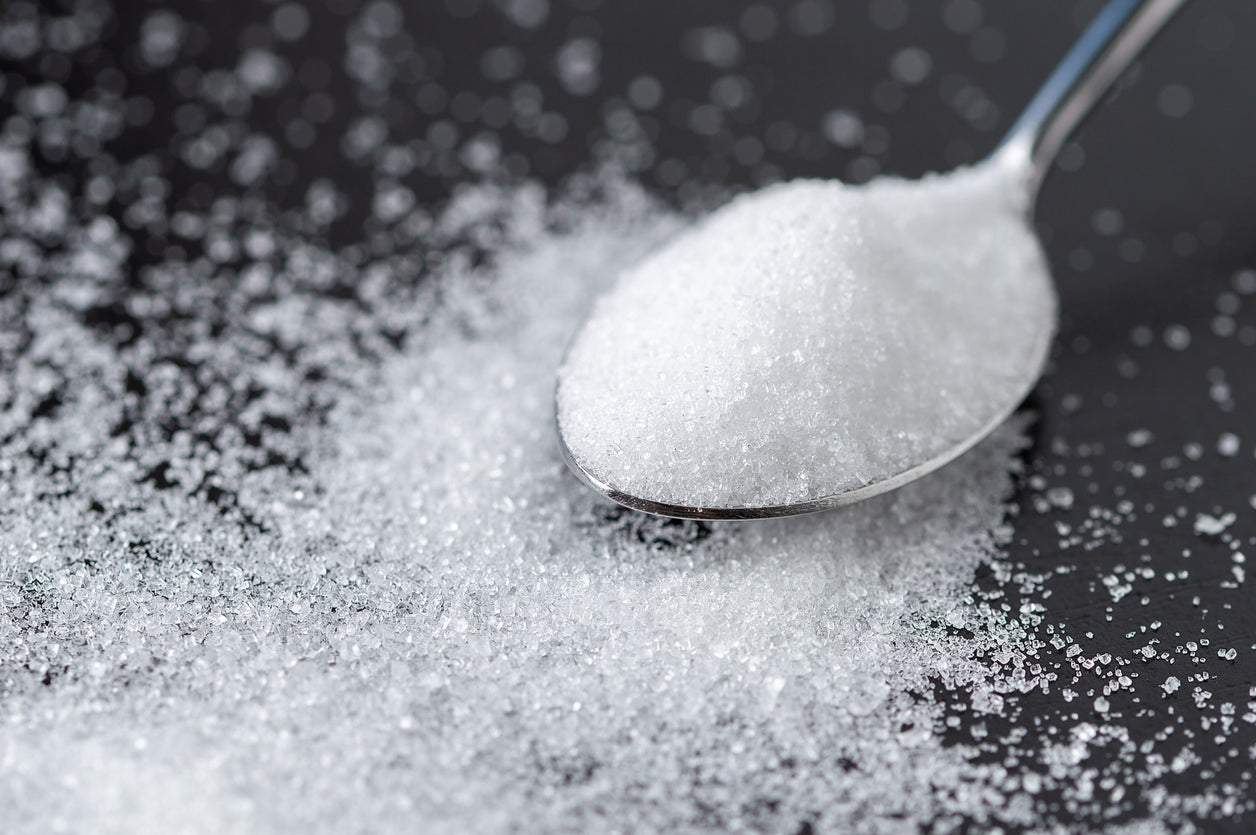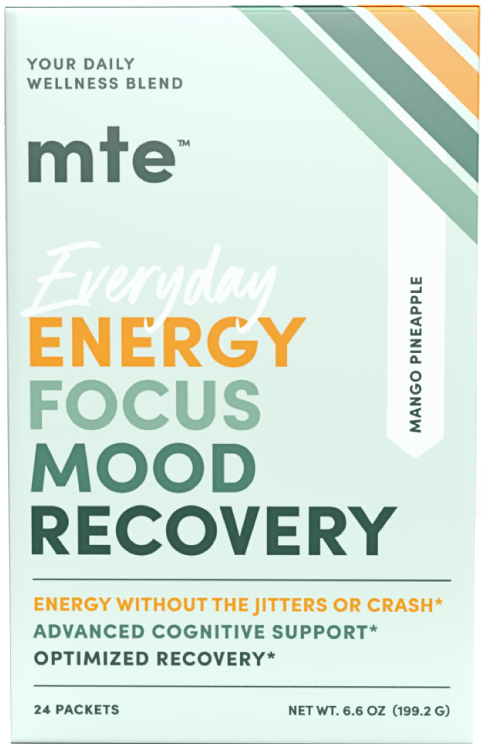
Unreal Sugars Come with Unreal Health Risks
The zero calorie sweetener movement has been in full swing over the last few decades as people are looking for ways to enjoy sugary stuff without the sugary part. Artificial sweeteners answer this problem – not only are they more efficient at sweetening things than sugar is, but they don’t have any calories. Perfect solution, right?
Not so fast –
The boom in popularity of zero cal and zero sugar “wellness” products has led to in-depth research on the short and long-term effects that synthetic sugars can have on human health. And it’s not cute. Regardless of the fact that many are approved by the FDA, there are definitely some lingering questions about their safety.
Let’s take a look at 3 of the most commonly-used artificial sweeteners in energy and health drinks:
Sucralose: 600 times sweeter than sugar, 0 calories
This guy is tricky, because many people confuse it with sucrose, which is just sugar’s science-y name. Sucralose is made from sugar, but it’s chemically altered so that it can’t be digested, which is why it has no calories and doesn’t affect blood sugar... maybe.
Sucralose was discovered by accident in the ‘70s when a scientist noticed that a compound being developed for insecticides smelled sweet. So that’s not great. Yet, in 1998 the FDA approved sucralose in 15 food categories, and shortly after approved it as a general sweetener. This approval was 100% based in animal studies.
However, sucralose is not an inert compound.
- A 2013 overview of the literature indicated that:
- One of sucralose’s hydrolysis products were found to be mutagenic (read: mutates genes) at elevated levels.
- Cooking with sucralose at high temperatures releases chloropropanols, a class of compounds considered toxic to humans.
- Sucralose can alter insulin, blood glucose, and blood sugar-related peptides.
- Another 2013 review linked sucralose to weight gain and increased risk of diabetes and heart disease.
- A 2014 study indicated sucralose is connected with the development of glucose intolerance via long-term disruption of the gut microbiome.
Perhaps most alarmingly, because of its implications for long-term consumption and accumulation in the fatty tissue of the body, are the results of a study published just this year on newborns of mothers who consistently consumed sucralose. It found that neonates whose mothers consumed sucralose were predisposed to weight gain, metabolic dysfunction, and low-grade chronic inflammation early in life.
Avoid sucralose by knowing all its names:
- Sucralose
- Splenda
- Trichlorosucrose
- 1,6-dichloro-1,6-dideoxy-beta-D-fructofuranosyl-4-chloro-4-deoxy-alpha-D-galactopyranoside
- E955 (Europe)
Aspartame: 200 times sweeter than sugar, 0 calories
Discovered in the ‘60s – once again, on accident – aspartame is the most well-known of the artificial sugars, and the most notorious. A synthetic compound, it was discovered during the development of an anti-ulcer drug when a scientist licked the compound off his finger and it tasted super sweet. It was approved in the US in 1981, and is now approved in over 100 countries.
Aspartame is a sleeper – while you’ll find studies from the ‘90s that found no links to adverse health effects, you’d be hard-pressed to find any from the last 10 years that agree:
- A 2022 population-based study on artificial sweeteners analyzed over 100000 people. They found that aspartame, specifically, was linked to:
- Higher risk of overall cancer
- Higher risk of breast cancers
- Higher risk of obesity-related cancers
- A 2017 systematic review and meta-analysis of the literature indicated aspartame consumption:
- Increases BMI and waist circumference
- Increases risk of metabolic syndrome and diabetes 2
- Increases risk of hypertension and cardiovascular events
- Increases risk of obesity
- A 2012 study on diet soda consumption and health risks analyzed nearly 120000 people. They found that drinking even 1 or 2 diet sodas daily was linked with increased risk of non-Hodgkin’s lymphoma, multiple myeloma and leukemia.
Avoid aspartame by knowing all its names:
- Aspartame
- NutraSweet
- Equal
- Canderel
- L-aspartyl-L-phenylalanine methyl ester
- APM
- Aspartylphenylalanine 1-methyl ester
- E951 (Europe)
Acesulfame: 200 times sweeter than sugar, 0 calories
Discovered by another scientist licking random compounds off his fingers in the ‘60s, acesulfame potassium is an artificial compound. Because of its ideal taste and how easy it is to synthesize it, it became a popular zero cal sweetener. It’s FDA approved for use in 90 countries. Chemically, it’s very similar to aspartame, and so comes with very similar health risks:
That same 2022 population study that indicated aspartame is linked to higher risk of overall cancers, breast cancers, and obesity-related cancers found similar indications for acesulfame specifically. Of the artificial sweeteners analyzed in that study, only the effects of aspartame and acesulfame were significant enough to be mentioned by their specific names.
Mice studies on acesulfame intake at parallel doses to what humans consume found links to negative cognitive and neurological effects:
Impairments in hippocampal functions like learning and memory
- Decreased intracellular ATP production
- Reduced cellular activity and viability
- Reduced protective activity of neuronal cells
Avoid acesulfame by knowing all its names:
- Acesulfame potassium
- Ace-K
- Sunett
- Sweet One
- 6-methyl-1,2,3-oxathiazine-4(3H)-one 2,2-dioxide potassium salt
- Potassium acesulfamate
- E950 (Europe)
Why MTE Uses Stevia in Our Formulation
When you’re working with a bunch of plants, you’re fighting flavonoids all the way. The bitter taste of adaptogenic plants is the plant’s defense mechanism, but it’s also indicative of the potent bioactivity of the plant. So you’ve got to have a little sweetness in there to break it up.
We use stevia extract in our formulation to accomplish a balanced taste with a lychee-passionfruit vibe perfect for smoothies or on its own. Stevia offers the same benefits as artificial sweeteners (300 times sweeter than sugar, 0 calories) but is way better for you.
Extracted directly from the stevia plant, it’s been used in South America for centuries. Stevia is chocked full of antioxidants and has not been observed to raise blood sugar. It’s totally natural and, unlike artificial sweeteners, doesn’t have creepy studies about health risks in humans lurking behind it. Because healthy energy needs to be, well – healthy!
Want to know more about MTE’s formulation? You can find all the specs on this potent plant-powered powder on our Ingredients page. And check out our Wellness Blog for more health tips and nutrition education. Get back to feeling like you’ve got the fuel to thrive with MTE: The Feel-Good Drink.



